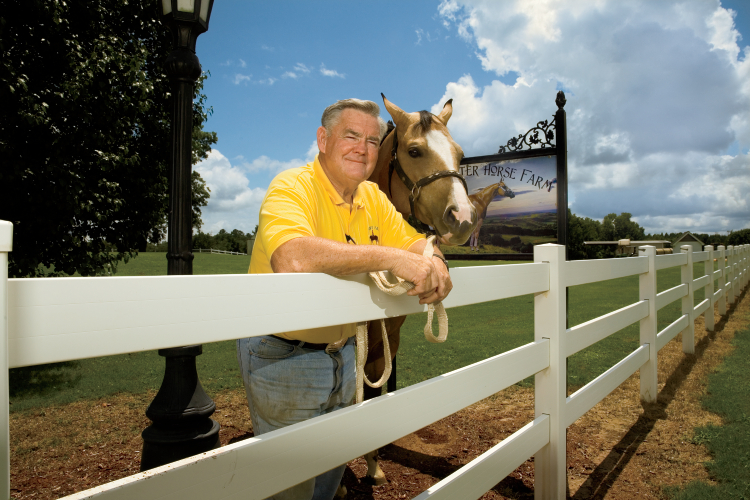Home > Georgia > Georgia Agritourism > Happy Trails for Georgia Equine
Happy Trails for Georgia Equine
Horses are big business in Georgia. Just ask Danny Hogan, who farms near Dexter.
Along with raising corn, soybeans, wheat, oats, grain sorghum and sesame seeds, he finds time to take care of more than two dozen horses. And he’s not alone. Having a horse or two, to take a trail ride, show in a class or compete, is a way of life for many Georgians.
“I can’t remember a time when we didn’t have horses,” Hogan says. “I guess you could say they raised me.”
As a founding member of the Georgia Equine Commission, he’s hoping many other youngsters get the same chance. Recently, the commission unveiled an equine license plate, which features a beautiful brown horse. Funds raised from the tag help with equine promotion, research and education. The group gets $10 from each $25 tag sold.
Horses rank sixth among top commodities in Georgia, with a farm gate value of $327 million annually. That contributes more than 8,500 jobs to the state’s economy.
Hogan wants even more youth and adults to have the experience of owning and taking care of horses. He’s helped put together a Youth Equine Day in Georgia, where 4-H and other youth leaders who have won awards with their horses are recognized at the state Capitol.
In the 1980s, legislators believed in the value of horses and kids so much that they allocated money to build the Agricenter at the Georgia National Fairgrounds so kids would have a top- notch place to show their horses.
Jim Floyd with the Georgia National Fairgrounds gets ready for 45 to 48 events in any given year, but by far the most important to him is the state 4-H and FFAlivestock show in February.
“Besides the Georgia State Fair, it’s the biggest, and one of the main reasons this facility (Agricenter) was built,” Floyd says. “The state of Georgia has one of the most active 4-H and FFA groups in the country. We care about our kids. Back in the ’80s, Rep. Larry Walker of Perry, Ga., pushed for this because he wanted a quality place for kids to show.”
The state fairgrounds has 1,143 acres and includes a multitude of buildings. Events include the National Barrel Racing Youth World Championship that requires 1,840 stalls and kids from 36 states and nine countries. A staff of more than 50 is needed to host all the events.
“We do the whole gamut with horses,” Floyd says. “The only thing we don’t do is hunter/jumpers.”
Mat Thompson, Equine Health Manager for the Georgia Department of Agriculture, makes sure horses at shows and on farms get good care.
“We had 900 new cases of neglect or complaints against individuals last year,” he says. “We’re having to deal with this in a different way because of the economy – we’re enlisting the help of rescue organizations, and it ends up we’re helping more horses than ever.”
Thompson says the state mandates humane care for horses, so a rescue organization may keep one for three to nine months, then provide training for that horse to become a barrel racer or trail ride horse. Then they are sold through an auction to the public, many to 4-H and FFA kids. In addition, the state has a program in which inmates help train and care for the abused horses.
“Last month, the inmates came and rode while their animals were being auctioned,” Thompson says. “It’s a big matter of pride with them to take that animal to the next level. There were a lot of tears too when that animal was sold.”
Hogan sees the industry going through some hard times because of the economy and not being able to slaughter horses.
In addition, it costs more to feed and travel to shows. At one time he raised 70, but now he raises 27.
“You can still sell a good pleasure horse for $3,500 and a good registered quarter horse for $25,000 to $30,000,” Hogan says. “Horses still bring a good price provided they’re good at something – barrel racing, reining, pleasure or racing.”
He’s hoping to bring the industry back to its heyday through the Equine Commission and his work as chairman of the Farm Bureau Equine Committee.
“We’re doing anything we can to promote horses,” Hogan says. “We’re going to continue to do that.”




